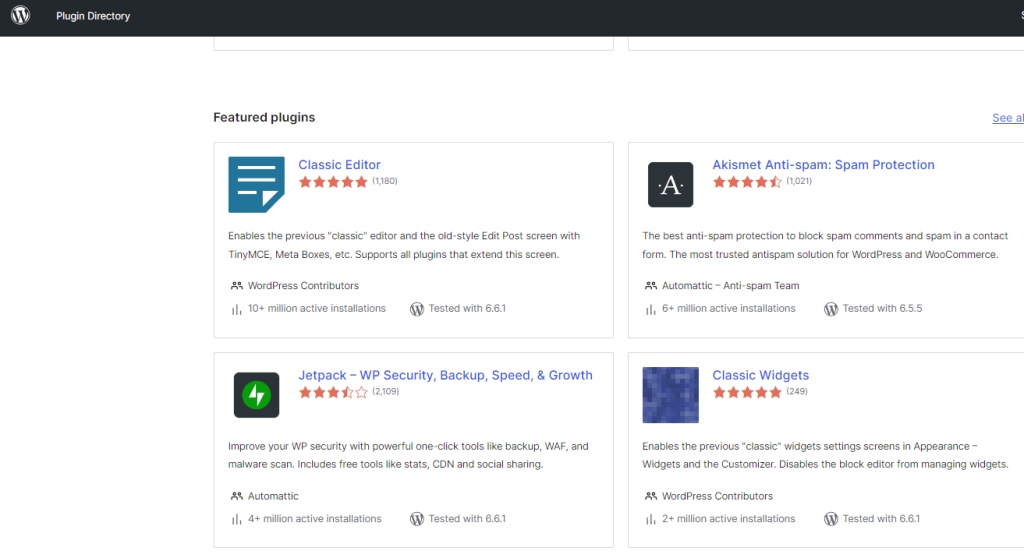In WordPress, a plugin is a type of software which extends the functionality of a WordPress website. This allows users to add new features, modify existing ones, or customize various aspects of their site without changing the core codebase of WordPress itself. Lets explore this article and learn the types of plugins in WordPress in few minutes.
Types of Plugins in WordPress
In WordPress, plugins can be categorized based on the type of functionality they provide. Here are some common types of plugins:

1. Content Management Plugins
These plugins help with managing and organizing content on your website. They can add custom post types, taxonomies, and custom fields, making it easier to create and manage different content types beyond regular posts and pages. Some of the Content Management plugins include Content Control, Secure Copy Content Protection and Content Views plugin.
2. SEO Plugins
SEO (Search Engine Optimization) plugins are designed to optimize your website for better search engine rankings. They provide tools and settings to improve on-page SEO, generate XML sitemaps, handle meta tags, and more. For Example RankMath, Yoast SEO, AISEO are some of the popular SEO plugins available on WordPress Directory.
3. Security Plugins
Security plugins enhance the security of your WordPress site by protecting against malicious attacks, implementing firewalls, and strengthening login procedures. Use plugins like Wordfence Security, Really Simple SSL, Jet Backup to safeguard your WordPress website.
4. Backup and Restore Plugins
These plugins automate the process of creating backups for your WordPress site, ensuring you can restore it in case of data loss or any unexpected issues. Plugins like UpdraftPlus, Jet Backup, Duplicator are the most commonly used for website backups.
5. Performance Optimization Plugins
Performance plugins focus on improving website speed and overall performance. They may include caching mechanisms, minification of scripts and styles, and lazy loading of images. W3 Total Cache, WP Optimize, LiteSpeed Cache are some of the popular plugins for optimizing your website’s performance.
6. Contact Form Plugins
These plugins enable you to create and manage contact forms on your website, allowing visitors to get in touch with you easily. Easily build contact form for website with the help of the plugins like Contact Form 7, WPForms, Ninja Forms.
7. Social Media Plugins
These plugins integrate your website with various social media platforms, enabling you to share content, display social media feeds, and add social sharing buttons. Social Media Share Buttons and Social Sharing Icons plugin helps in sharing social media content effectively.
8. E-commerce Plugins
E-commerce plugins turn your WordPress site into an online store, providing features like product listings, shopping carts, payment gateways, and order management. WooCommerce is one of the most installed WordPress plugins with 7+ million active installations.
9. Membership Plugins
Membership plugins facilitate the creation of membership-based websites, restricting access to certain content for registered members only. Plugins like Ultimate Member, Simple Membership provides good security for your website content.
10. Analytics Plugins
Analytics plugins help you track website traffic, user behavior, and other essential metrics by integrating with popular analytics services like Google Analytics. MonsterInsights, GA Google Analytics are the most popular plugins used for analyzing website traffic.
11. Page Builder Plugins
Page builders offer a drag-and-drop interface, allowing users to create complex page layouts without any coding knowledge. Elementor website builder plugin has 10+ million active installations.
12. Translation Plugins
These plugins enable you to translate your website content into multiple languages, making it more accessible to a global audience. Use plugin like Translate WordPress with GTranslate to make your website’s language multilingual.
13. Comment System Plugins
Comment system plugins enhance the default WordPress commenting system by providing features like threaded comments, social media login options, and spam protection. Akismet Anti-spam, Disable Comments are the most commonly used plugins for spam protection.
These are just a few examples, but there are many different types of plugins available for various purposes in the official WordPress Plugin Directory and other marketplaces. It’s essential to choose plugins wisely and avoid excessive use to maintain site performance and security.

